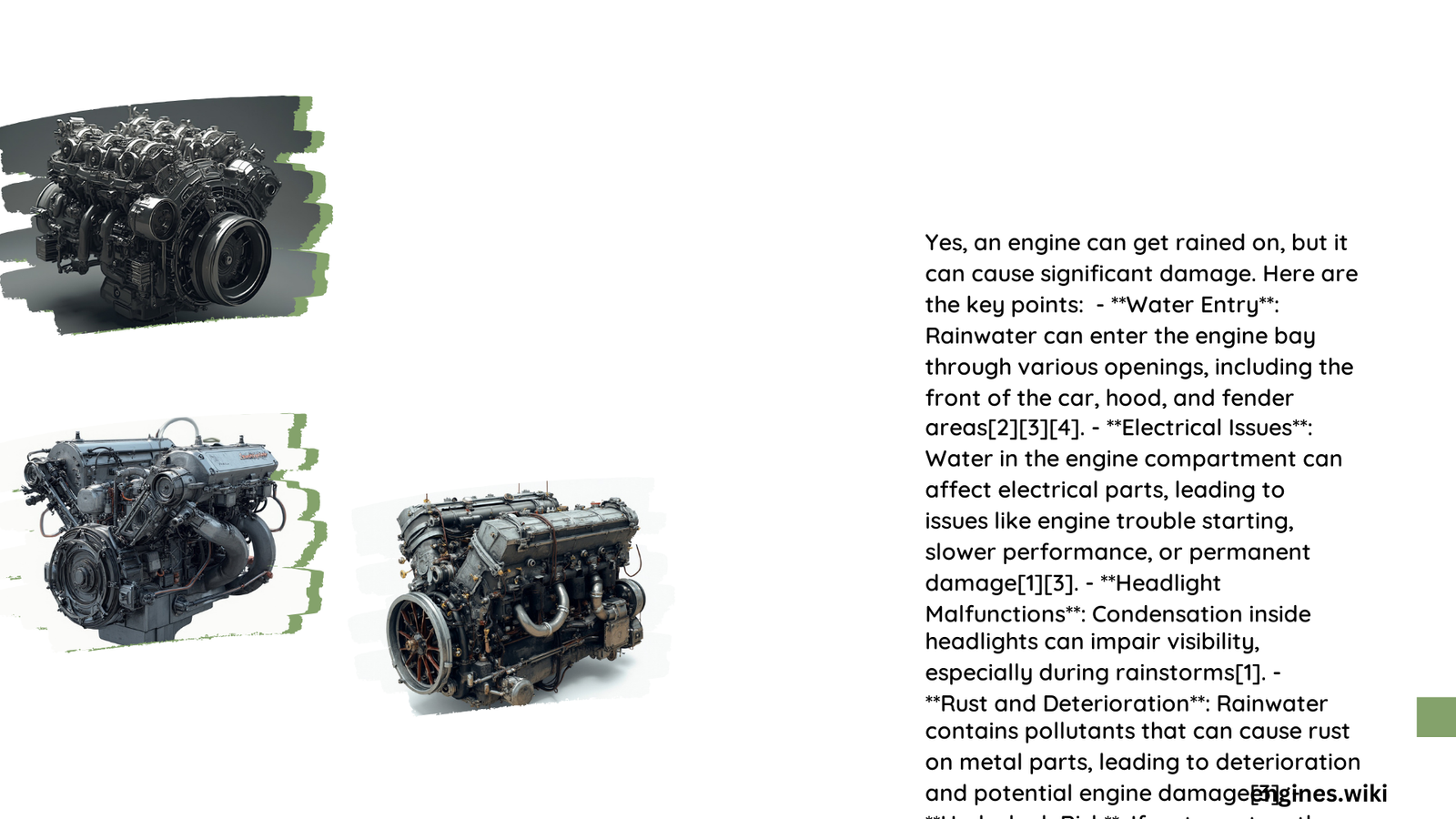An engine can get rained on, but it’s not without risks. While modern engines are designed to withstand some exposure to the elements, prolonged or intense rain can lead to various issues. These range from minor performance hiccups to severe damage requiring costly repairs. Understanding the potential impacts of rain on your engine and knowing how to protect it can save you from unexpected breakdowns and expensive fixes.
What Happens When an Engine Gets Rained On?
When an engine gets rained on, several components are at risk of water damage. The severity of the impact depends on factors such as the intensity of the rain, duration of exposure, and the engine’s design. Here’s a breakdown of what can happen:
- Electrical System Damage: Water can seep into electrical connections, causing short circuits or corrosion.
- Hydrolocking: If water enters the combustion chamber, it can cause hydrolocking, potentially leading to severe engine damage.
- Rust and Corrosion: Prolonged exposure to moisture can accelerate rust formation on metal components.
- Air Filter Saturation: A wet air filter can restrict airflow, affecting engine performance.
Which Engine Components Are Most Vulnerable to Rain?

Not all parts of an engine are equally susceptible to rain damage. Some components are more at risk than others:
- Air intake system
- Electrical connections and wiring
- Spark plugs and ignition system
- Engine control unit (ECU)
- Alternator
- Battery terminals
How Does Rain Affect Engine Performance?
Rain can impact engine performance in several ways:
- Reduced Power Output: Wet components can lead to misfires and decreased power.
- Increased Fuel Consumption: The engine may need to work harder, consuming more fuel.
- Stalling: In severe cases, water ingestion can cause the engine to stall.
- Starting Issues: Moisture in the electrical system can make starting difficult.
Can Modern Engines Withstand Rain Better?
Modern engines are generally better equipped to handle rain compared to older models. Here’s why:
- Improved sealing and weatherproofing
- Better-designed air intake systems
- More robust electrical components
- Advanced corrosion-resistant materials
However, this doesn’t mean they’re immune to water damage. Proper maintenance and precautions are still necessary.
What Are the Long-Term Effects of Engine Rain Exposure?
Repeated or prolonged exposure to rain can lead to several long-term issues:
- Accelerated Wear: Moisture can break down lubricants, leading to increased friction and wear.
- Electrical System Degradation: Corrosion can slowly damage electrical components over time.
- Reduced Engine Lifespan: Cumulative effects of water exposure can shorten the engine’s overall lifespan.
- Increased Maintenance Costs: More frequent repairs and part replacements may be necessary.
How Can You Protect Your Engine from Rain Damage?
While you can’t always avoid rain, there are steps you can take to minimize its impact on your engine:
- Use a Car Cover: When parked, use a waterproof car cover to shield the engine compartment.
- Regular Maintenance: Keep up with scheduled maintenance to ensure seals and gaskets are in good condition.
- Avoid Deep Water: Don’t drive through deep puddles or flooded areas.
- Dry the Engine Bay: After heavy rain, open the hood to allow the engine bay to dry out.
- Apply Water-Repellent Coatings: Consider using specialized coatings on vulnerable components.
What Should You Do If Your Engine Gets Rained On?
If your engine has been exposed to heavy rain:
- Don’t start the engine immediately if you suspect water ingestion.
- Check the air filter and remove any excess water.
- Inspect electrical connections for signs of water.
- If in doubt, have a professional mechanic inspect the engine.
Are There Any Benefits to Rain for Engines?
While rain generally poses risks, there can be some minor benefits:
- Natural Cleaning: Light rain can help wash away dust and debris from the engine bay.
- Cooler Operating Temperatures: Rain can temporarily help cool an overheating engine.
However, these benefits are outweighed by the potential risks of water damage.
How Do Different Types of Engines Handle Rain?
Different engine types have varying levels of resistance to rain:
| Engine Type | Rain Resistance | Notes |
|---|---|---|
| Gasoline | Moderate | Vulnerable to water in combustion chambers |
| Diesel | Higher | More robust design, but still at risk |
| Electric | Variable | Depends on weatherproofing of components |
| Hybrid | Moderate to High | Combines gasoline and electric vulnerabilities |
What Are the Costs Associated with Rain-Induced Engine Damage?
The costs of repairing rain-induced engine damage can vary widely:
- Minor electrical issues: $100 – $500
- Hydrolocked engine repair: $3,000 – $8,000
- Full engine replacement: $5,000 – $15,000+
Prevention is often much more cost-effective than repair.
How Does Climate Affect the Risk of Rain Damage to Engines?
Climate plays a significant role in the risk of rain damage:
- Humid Climates: Higher risk due to increased moisture and potential for corrosion.
- Coastal Areas: Salt in the air increases corrosion risk, even with light rain.
- Arid Climates: Lower risk, but sudden rainstorms can catch drivers unprepared.
Understanding your local climate can help you take appropriate precautions.
In conclusion, while engines can get rained on, it’s crucial to understand the risks and take preventive measures. Regular maintenance, proper driving habits, and quick action after rain exposure can help protect your engine and avoid costly repairs.
